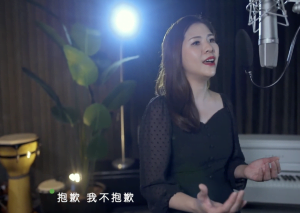Vocal Coach Esther’s Music Video produced by Hark Music, pov by Ariana Grande at the bottom of this article!

Can you tell us a bit about your background and how you got into coaching vocals?
I started singing and playing at a very young age as my family (mom’s side) is quite a musical/artistic family. So, I was always exposed to music, singing, and instruments. I went ahead to have CCAs and other outside music-related courses, though they all didn’t last long. After going to church at 12 or 13 years old, I started picking up music by myself, teaching myself to play the guitar, piano, and sing. Years later, I was invited to a few secondary schools to coach their bands in vocals. As I graduated from university and started pursuing music as a full-time career, my friend, who was doing the same, introduced me to Hark Music, and the rest is history.
How do you tailor your coaching to fit the needs and goals of each individual student?
When I hear them sing for the first time, I think about what their voice’s “selling point” is. I try my best to bring it out and/or retain that part to keep their uniqueness. We use the songs they personally love to work on what they can improve so that they can better see an improvement to that song that they’ve always sung but with some breakthroughs. I ask them about their main concerns while they are singing that song, and then we will start training from there. I think this ensures that they feel that whatever we are learning is relevant to their needs at the moment, and keeps class interesting and exciting, especially when they see a breakthrough.
What do you think are the most important techniques or skills to have to be a good singer?
Breathing techniques, intentionality and emotion, being able to relax in any situation, and, if you’re a performer, to be engaging with the audience.
What are some common mistakes or challenges that students face when learning vocals, and how do you help them overcome those?
One common mistake I’ve noticed is the inability to “sigh.” I’ve discussed this with some of my students, and most of them agree that they’ve never done this before. The reason often lies in societal pressure and the impression that sighing is a sign of displeasure or dissatisfaction and is rude to show. It was an interesting insight. Of course, the next most common challenge is not being able to activate the right muscles to sing and reverting to their old habits of straining other muscles from their chest up.
Last but not least, a lot of students have mental blocks because of fear or shyness. When I see that they cannot overcome the mental block and we’re stuck somewhere, I tend to give them a bit of a pep talk.
Can you walk us through your typical lesson structure or approach to teaching vocals?
I would start with warm-ups, which would take 10-15 minutes, sometimes more if a student is extremely new to vocal warm-ups and workouts. We will then sing the song we mutually agree to work on, pick out one or two things to work on for the day, and start working on specific areas. Then, we will apply what we’ve learned to the song they first sang.
What do you think sets Hark Music apart from other music schools, and how does it support your coaching?
To be honest, I haven’t been to other music schools, so I can’t give an accurate comparison. However, if I had to say, I would say that Hark Music’s flexibility, constant pursuit of innovation and improvement in its systems, and its ability to stay relevant to the current scene are what set it apart.
How have you grown as a person after becoming a vocal coach at Hark?
I think I’ve learned to pace myself, evenly distribute my energy, and take my time because I tend to be overly passionate. While that has its good points, it can also backfire. I’ve also grown vocally as I adopt the teachings this school provides and work on my own vocals. I’ve been inspired by meeting so many people from different walks of life who have different reasons for taking lessons.
Can you describe a proudest moment in your journey as a Vocal Coach?
I think it would have to be the times when my students give me an enlightened look on their faces when they feel a change in their singing. There’s no one particular proudest moment.
What else do you do in Hark Music besides coaching?
I am a full-time singer-songwriter. I sing at festivals and shows, write and release my own songs, and write and sing for corporate companies.
What do you love most about being a part of the Hark Music family?
I love that our boss is very friendly, and this place gives flexibility to everyone who’s working here.
Choose three core values that you go by, as a person and as a coach.
Conviction, passion, and innovation
Tell us something more about yourself, i.e., things we don’t know! E.g., your other passions, your secret talent, etc.
I can only do the multiplication table from 1-9 in song because that was how I learned it. So, if you ask me for example, 6 x 9, I will actually have to sing it all the way to that point to be able to answer you.




